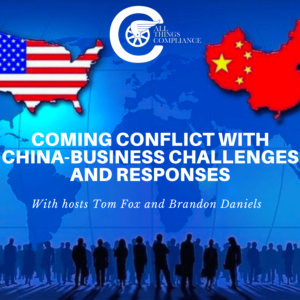 Recently multiple podcasts on the Compliance Podcast Network have been selected by the Academy of Interactive and Visual Arts to be recognized as a Communicator Award winner for podcast excellence. I wanted to thank our listeners and fans who voted for us and have made the Compliance Podcast Networkone of the most award-winning podcast network in the country.
Recently multiple podcasts on the Compliance Podcast Network have been selected by the Academy of Interactive and Visual Arts to be recognized as a Communicator Award winner for podcast excellence. I wanted to thank our listeners and fans who voted for us and have made the Compliance Podcast Networkone of the most award-winning podcast network in the country.

Never The Same, How the Russian Invasion Changed the World Forever was a passion project co-hosted by myself and Exiger President and CEO Brandon Daniels. It was awarded two 2023 Communicator Awards. The first was an award of Excellence for Individual Episodes, in the podcast category of Business. The second was for Excellence in a Featured Series.
The Russian invasion of Ukraine changed the geopolitical landscape forever. It has brought a fundamental challenge to international norms, sovereignty and the rule of law that underpins global business. It made doing business more challenging and complex than ever. In this podcast series, co-hosts Tom Fox and Brandon Daniels discussed five key business areas have changed forever after the Russian invasion. We explored the sea of changes in the area of supply chains, trade and economic sanctions, anti-Bribery and anti-corruption, cyber security and ESG. Check out the entire 5-part series here.

The Big Empty and Economic Issues Facing 21st Century Texas, co-hosted by Tom Fox and Loren Steffy was honored with two 2023 Communicator Awards. The first was for Excellence in the category of Limited Series. The second was for Distinction for Individual Episodes, in the Business Podcasts category.
This series was based on Steffy’s seminal fiction work The Big Empty which tells the story of a small West Texas town on the cusp of the new millennium, a lifelong cowboy wonders if a new semiconductor plant will ensure a future for his son or eliminate the only way of life he’s ever known. The Big Empty set in 1999, is a tale about the sense of place and tells the story of a fictional company AzTech which builds a semi-conductor plant in the dying west Texas city of Conquistador The story presages a series of cultural, economic, geographic and resources conflicts that are embedded in 2023 Texas. The podcast series focuses on current economic and culture issues faced by the state of Texas, its governments and its citizens, all explored through the prism of Steffy’s book, The Big Empty. Over this special podcast series we considered the following issues facing Texas today; including water, power, land investment, housing and the clash of cultures. Check out the full five-part series here.
 Coming Conflict with China-Business Challenges and Responses, won 2 awards for Distinction. The first was for a Limited Series and the second was in the Business-to-Business Category.
Coming Conflict with China-Business Challenges and Responses, won 2 awards for Distinction. The first was for a Limited Series and the second was in the Business-to-Business Category.
In this podcast, which I co-host with Exiger President and CEO Brandon Daniels, we considered how in the short span of the 21st Century, the world’s two top powers, the United States and China, have moved inexplicably towards a showdown. This evolved from a commercial competition into something more akin to permanent non-kinetic warfare. What does this mean for US business doing business in and with China? In this special 5-part blog post series, we explore issues diverse as real danger, supply chain, exports, cyber-attacks and IP theft from the business perspective and give the compliance and business executive their viewpoints on what you can do to not only prepare your company but protect it as well. The challenges your company faces and more importantly the responses you make will go a long way towards determining if your organization will weather the coming storm. Check out the full 5-part series here.

Data Driven Compliance. One of the newest podcasts on the Compliance Podcast Network, having premiered in February 2023, was awarded a 2023 Communicator Awards Distinction for Individual Episodes, in the category of Business-to-Business. In this podcast series, host Tom Fox discusses and visits with experts on how to use data to improve and enhance the effectiveness of your compliance program, creating greater business efficiency, all leading to more return on the investment for your compliance regime. The podcast is sponsored by Kona AI. Check out the inaugural episode, where I visit with Kona AI CEO Vince Walden on the develop of data driven compliance.

The Night Sky-a Podcast on the Two Eclipses Coming to Kerrville. Taking a completely different route is my passion project The Night Sky which I co-host with Andrew Gay. This podcast received a Communicator’s Award of Excellence in the category of Individual Episodes-Science & Medicine.
In this podcast series, Andrew and myself celebrate that for two days over the next 18 months, Kerrville, TX will be the Eclipse Capitol of the World. The first will be an annular solar eclipse will occur on October 14, 2023, and the second a total solar eclipse taking place on April 8, 2024. The 2023 annular eclipse will be a partial eclipse that will create a ring of fire around the sun and the 2024 event will be a total eclipse where full darkness occurs. In this podcast, we discuss how the town of Kerrville will prepare for an influx of a quarter million (or more) visitors. For a flavor of the podcast, check out our inaugural episode, where we host Dr. Ben Locwin who explains the two eclipses.
I would love to host you and your podcast on the Compliance Podcast Network. It is the only podcast network dedicated to compliance but as you can see by many of these award-winning podcasts we are not limited strictly to compliance. In fact, the only thing we are limited by is our collective imaginations. So, do you have an idea for a podcast? Do you have a passion you want to discuss? Then give me a call or shoot me an email.






